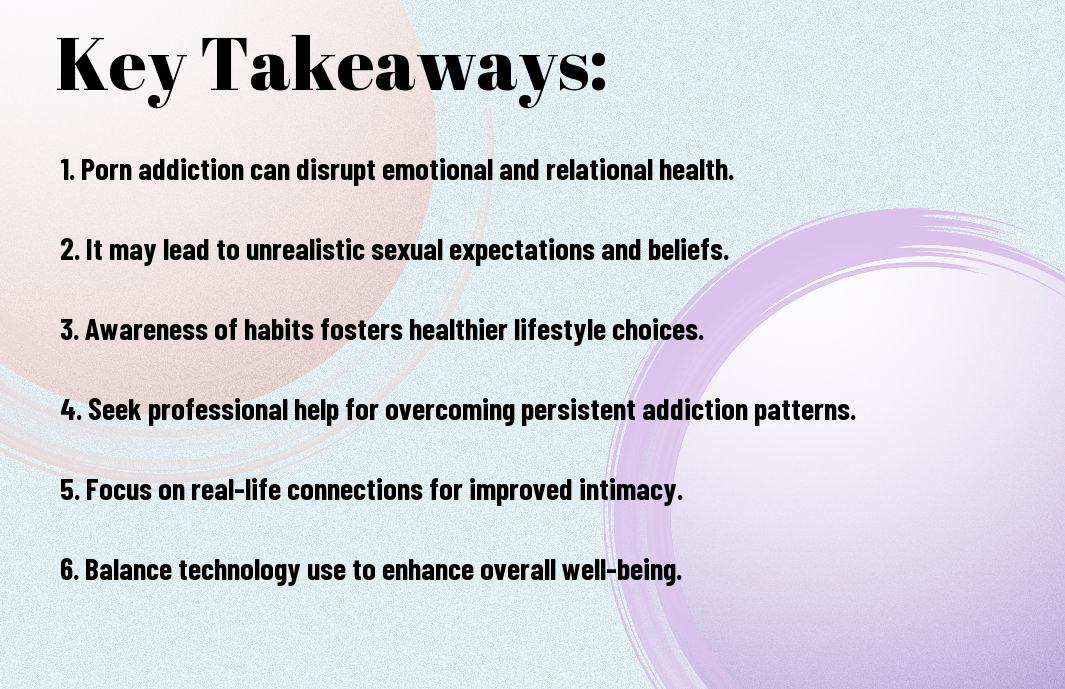You may have questions about the impact of porn addiction on your life and well-being. As you navigate the complexities of relationships, self-esteem, and mental health, understanding the potential effects of porn consumption becomes vital. This blog post will provide key insights into how porn addiction can affect you, offering guidance for fostering a healthier, more fulfilling lifestyle. By examining both the psychological and relational aspects, you’ll gain a clearer perspective to help you make informed choices for your personal health and happiness.
Key Takeaways:
- Porn addiction can negatively impact emotional well-being and interpersonal relationships.
- Recognizing signs of addiction, such as compulsive use despite negative consequences, is vital for personal growth.
- Engaging in open discussions about porn consumption can help reduce stigma and encourage healthier habits.
- Seeking professional help or support groups can provide effective strategies for overcoming addiction.
- Fostering a balanced approach to intimacy and sexual health is crucial for overall quality of life.

Understanding Porn Addiction
Your journey in understanding porn addiction may start with recognizing that it can significantly impact your life. It is important to face the reality that compulsive consumption of pornography could interfere with your relationships, mental health, and overall well-being. If you’re struggling with this issue, you can find hope in the fact that Pornography addiction can be beat. Seeking guidance is the first step to recovery.
Definition and Signs
For many, porn addiction is characterized by excessive consumption of pornographic material despite adverse consequences. Signs may include a preoccupation with porn, unsuccessful attempts to cut back, neglecting responsibilities, and experiencing emotional distress when engaging in the behavior.
Psychological and Emotional Effects
Psychological effects of porn addiction can manifest in various ways, including anxiety, depression, and low self-esteem. Users often find themselves feeling isolated and unable to form genuine emotional connections, as they might prefer the escapism that pornography provides over real intimacy.
Plus, the emotional toll of porn addiction can lead to damaging thought patterns and behavioral issues. You may feel shame or guilt, which can exacerbate feelings of inadequacy and loneliness. Over time, this cycle can diminish your quality of life and lead to persistent psychological struggles that require attention. Seeking help and addressing these underlying issues is vital for fostering a healthier and more fulfilling life.
Impact on Relationships
Some individuals struggling with porn addiction often find that their relationships suffer as a result. This addiction can lead to unrealistic expectations and emotional distance, making it challenging to connect with partners on a deeper level. As the addiction consumes more of your attention and energy, the quality of your intimate and personal relationships may diminish, causing both partners to feel isolated and disconnected.
Communication Breakdown
Any addiction can create walls between you and your partner. Poor communication often leads to misunderstandings, resentment, and feelings of neglect, effectively hampering your ability to resolve conflicts. As you become less willing to discuss your needs and desires due to fear of judgment, the gap between you and your loved one widens, further complicating your relationship.
Intimacy Issues
By engaging with porn, you may inadvertently develop intimacy issues that detract from your emotional and physical connections. Over time, your expectations of intimacy can shift, leading you to prioritize the fantasy portrayed in adult films over the reality of a meaningful, shared experience with your partner.
In addition, this reliance on pornography can decrease your ability to experience genuine pleasure and connection with a partner. You might find it increasingly difficult to feel satisfied with real-life intimacy, which can create a cycle of frustration and disappointment. This cycle often leads to further withdrawal and isolation, ultimately causing significant strain on your relationships and emotional well-being.

Effects on Mental Health
Not acknowledging the impact of porn addiction can lead to profound mental health issues. Over time, excessive consumption can alter your brain’s reward system, leading to increased feelings of anxiety, loneliness, and depression. This cycle may create a dependence where you feel you need porn to function, making it hard to find joy in real-life interactions and achievements.
Anxiety and Depression
To fully understand the relationship between porn addiction and your mental health, consider how excessive use can trigger or exacerbate feelings of anxiety and depression. As you rely on porn for gratification, you might find it increasingly challenging to connect with others emotionally, leading to isolation and sadness over time.
Self-Esteem Challenges
Around the topic of self-esteem, porn addiction can have significant implications. You may increasingly compare yourself to the unrealistic portrayals in adult content, leading to dissatisfaction with your own body or relationships.
This dissatisfaction can further feed into a cycle of low self-esteem, making you feel inadequate or unworthy. As you internalize these feelings, the pressure to conform to such unrealistic standards can hinder personal growth and lead to a persistent sense of failure, adversely affecting your mental and emotional well-being. It’s important to recognize these patterns to foster a healthier self-image and re-establish a more positive relationship with yourself.
Overcoming Porn Addiction
All people struggling with porn addiction face unique challenges, but understanding your triggers and establishing healthier habits is critical for recovery. Educating yourself can help you grasp the Psychology of Porn Addiction: Why It’s Hard to Quit. Take small, measurable steps toward a healthier lifestyle, focusing on self-improvement and self-awareness.
Strategies for Recovery
Addiction recovery often requires multifaceted strategies tailored to your specific needs. Start by identifying underlying issues that contribute to your reliance on porn and work on establishing coping mechanisms. Engage in activities that promote well-being, like exercise and mindfulness, to redirect your energy positively.
Seeking Professional Help
Overcoming addiction can be daunting, and seeking professional help offers valuable support and guidance. Finding a therapist specializing in behavioral addictions can provide you with coping strategies and accountability to foster lasting change.
Further, a professional can help you navigate underlying emotional challenges, providing insights and techniques that you may not have considered. They can facilitate open dialogue about your experiences and enable you to develop personalized strategies for recovery. Investing in professional help can significantly enhance your journey toward a healthier, addiction-free life.

Healthy Alternatives to Porn
Now, exploring healthier alternatives to porn can significantly enhance your quality of life. Engaging in activities that promote emotional and physical well-being can help you break free from dependency on pornographic material. By implementing positive habits such as exercise, mindfulness, or creative hobbies, you can cultivate a more fulfilling and enriching lifestyle. These alternatives not only divert your attention but also provide you with genuine satisfaction and fulfillment.
Building Intimacy
Behind every meaningful relationship is a foundation of trust and emotional connection. Fostering intimacy with your partner can help you rediscover the beauty of physical and emotional closeness. Engage in open communication, share your thoughts and feelings, and spend quality time together. Deepening this bond can lessen the need for external sources of gratification and create a satisfying connection that nurtures both partners.
Engaging in Fulfillment
Between activities like volunteering, pursuing hobbies, or developing new skills, you can find avenues for personal growth that offer a sense of purpose. These fulfilling engagements will distract you from porn and lead to improved self-esteem and mental well-being. By immersing yourself in meaningful experiences, you can redirect your focus and energy towards rewarding achievements that enhance your daily life.
Plus, embracing pursuits that resonate with your passions can cultivate a richer sense of identity and accomplishment. Whether it’s taking a cooking class, joining a local sports team, or engaging in creative arts, such actives open up opportunities for you to connect with like-minded individuals. These connections can lead to deeper relationships, which further reinforces your emotional satisfaction and reduces reliance on porn as a source of pleasure or escape.
Societal Views on Pornography
Unlike many past generations that frequently stigmatized sexual expression, today’s society exhibits a more complex view on pornography. While some see it as a natural part of adult life, others raise concerns about its effects on mental health and relationships. As you navigate this discussion, consider exploring signs of porn addiction through comprehensive resources like the Porn Addiction Symptoms & Recovery Guide, which can help you understand the potential implications for a healthier lifestyle.
Cultural Perspectives
For many cultures, pornography presents varying levels of acceptance, often reflecting societal values and norms regarding sexuality. While some cultures embrace open discussions about sexual health and its associated media, others remain conservative, viewing pornography as detrimental. Your understanding of these cultural perspectives can help you navigate your own views on pornography.
Changing Narratives
Against a backdrop of increasing awareness around mental health, narratives surrounding pornography are starting to shift. There is a greater acknowledgment of the potential harms and addiction linked to excessive use. This change in dialogue encourages you to reflect on your engagement with pornography and its impact on your well-being.
Understanding the changing narratives surrounding pornography can provide valuable insights into your feelings and behaviors. As conversations about mental health and addiction become more prominent, it is crucial for you to remain informed and aware of how these societal shifts influence your perspective. By embracing a more comprehensive view, you can make informed decisions that support your mental health and overall quality of life.

Conclusion
Taking this into account, recognizing the potential impacts of porn addiction on your life is imperative for fostering healthier relationships and self-understanding. By evaluating your consumption patterns and seeking support when needed, you can take proactive steps towards improving your mental and emotional well-being. Being aware of the signs is the first step towards making informed choices that promote a more fulfilling and balanced life.
FAQ
Q: What is porn addiction?
A: Porn addiction refers to a compulsive and excessive use of pornographic material that interferes with an individual’s daily life, relationships, and overall well-being. It can lead to negative emotional and psychological consequences as individuals may prioritize pornography over real-life interactions and responsibilities.
Q: How can I tell if I have a porn addiction?
A: Signs of porn addiction include spending excessive time viewing porn, neglecting responsibilities, experiencing withdrawal symptoms when not viewing porn, feeling unable to control the behavior, and noticing a decrease in sexual satisfaction or intimacy with a partner. If these behaviors resonate with you, it may be worthwhile to assess your relationship with pornography.
Q: What are the potential negative effects of porn addiction on mental health?
A: Porn addiction can result in various negative effects on mental health, including anxiety, depression, low self-esteem, and unrealistic expectations about sex and relationships. Continued exposure to porn can also lead to desensitization, making it harder to achieve arousal in real-life situations, which can further exacerbate mental health issues.
Q: Can porn addiction affect my relationships?
A: Yes, porn addiction can seriously impact relationships by creating unrealistic expectations about intimacy, reducing sexual satisfaction with a partner, and fostering feelings of betrayal or inadequacy in a partner. Communication breaks down when one partner feels sidelined by the other’s obsession with porn, leading to misunderstandings and conflict.
Q: Is it possible to recover from porn addiction?
A: Recovery from porn addiction is definitely possible. Many individuals seek help through therapy, support groups, or self-help strategies. Understanding the underlying reasons for the addiction, developing healthier coping mechanisms, and finding support from professionals or loved ones can greatly assist in the recovery process.
Q: What steps can I take to reduce or eliminate my porn consumption?
A: To reduce or eliminate porn consumption, you can set clear goals for yourself, identify triggers that lead to watching porn, and replace that habit with healthier activities. Engaging in hobbies, exercising, or seeking therapy can help redirect focus and improve overall well-being. Establishing accountability by sharing your goals with trusted friends or family members can also be beneficial.
Q: How can I support someone who is struggling with porn addiction?
A: Supporting someone with porn addiction involves being understanding and non-judgmental. Listen to their struggles, encourage them to seek professional help, and offer to support them through their recovery process. It’s important to educate yourself about addiction and refrain from shaming or blaming. Rather, focus on fostering open communication and creating a safe space for discussions about their challenges.
